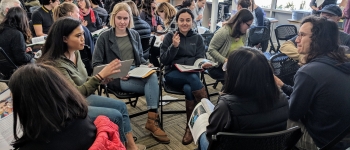Community service learning (CSL) and community engaged learning (CEL) include a range of high-impact pedagogical practices that enhance students’ learning and foster civic understanding through active course-based learning that involves meaningful collaboration with community partners. The academic study may be in any discipline or combination of fields. Student learning outcomes benefit the common good, whether through direct service to communities in need or the organizations that serve them or through indirect service projects that contribute to community capacity building more broadly.
CSL and CEL enhance academic learning by allowing students to make connections between their classroom education and its application to the field. These high-impact learning experiences help students to clarify their career goals and acquire work-related skills, develop a heightened sense of civic responsibility and awareness of moral and ethical issues, and provide them with a wide variety of work options with a goal of being value-added for the community they serve. Working from a common understanding will further the university’s identity as an “engaged institution,” contribute to quality transparent learning experiences for students, and offer opportunities for faculty dialogue and scholarship within and across disciplines.
Course Definitions
We define courses as community-engaged or service-learning based on the student learning experience and community impact, not course title.
Our broad term for these courses is "community-engaged learning" which classifies the variety of curricular community-based learning experiences and activities that students engage in that contribute to the public good, commonly through arts, education, equity, health, sustainability, economic development. A course is considered ‘community-engaged’ based on implementation, not a title or course label. Within CEL, practices vary widely in terms of depth, breadth, and scope of student activities and partnerships. CEL courses may use such terms as fieldwork, applied, practicum, internship, and service.
Community-Engaged Learning (CEL) refers to courses in any discipline that have some type of community-engaged assignment built around reciprocal partnerships to benefit the common good and enhance student learning. Collaborative project goals and priorities are driven by community partners and negotiated with faculty and students involved in the CEL opportunity. Collaborative projects may focus on improving community resources or capacities, participatory or action research projects, or implementing a range of other activities to advance community-identified goals and strategies.
Service-learning is a specific type of Community-Engaged Learning in which substantive community engagement and the related community partnerships are a critical component of course learning, with equal focus on community impact and student learning related to social justice or responsibility. Service-learning courses may also be labeled with a variety of titles.


